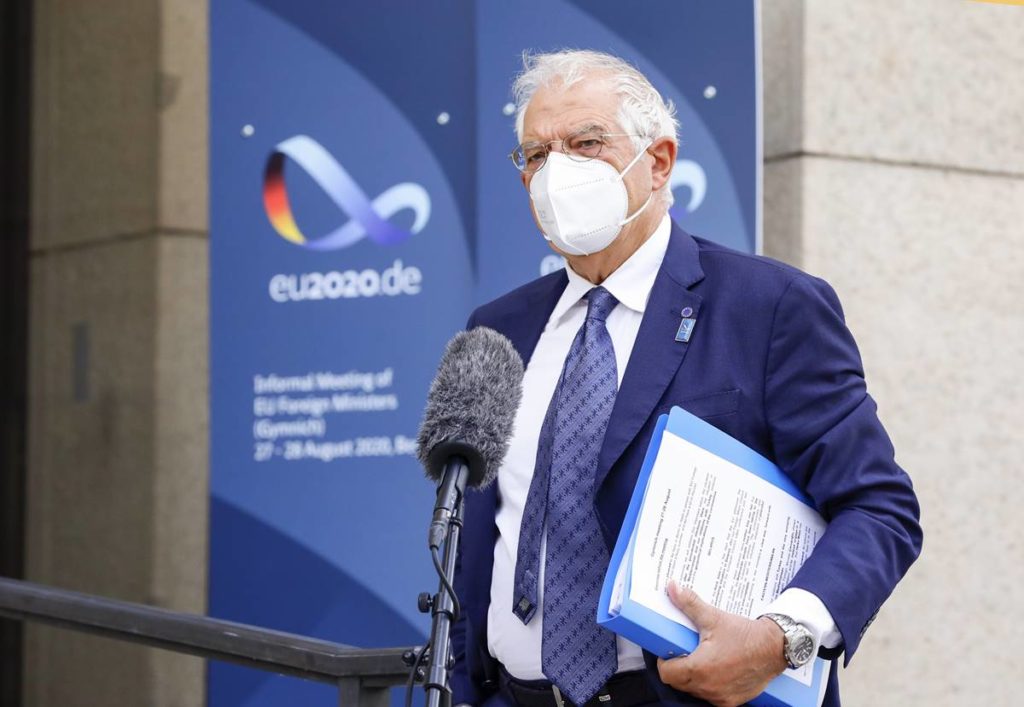The informal meeting of EU foreign ministers in Berlin last week focused on stepping up sanctions against Belarus after the fraudulent elections there and imposing possible sanctions on Turkey because if its drilling operations in disputed waters in the eastern Mediterranean Sea.
The meeting, also called the Gymnich meeting after the German castle where these meetings started in 1974, offers the EU member states an opportunity to engage in an informal dialogue to discuss sensitive foreign policy issues and to meet foreign ministers from non-EU countries.
“We have had a summer of crises,” said Josep Borrell, High Representative of the Union for Foreign Affairs and Security Policy, at the joint press conference with Heiko Mass, the German minister for foreign affairs, on Friday (28 August).
As regard Belarus, the EU does not recognise the results of the elections on 9 August and considers the actions of the authorities unacceptable.
“We, once again, express our fully support to Belarus’ sovereignty and independence, condemn the violent repression of the Belarusian people and we ask the authorities to engage in an inclusive dialogue to move out of the crisis,” Borrell said. He added that the EU supports a proposal from OSCE to facilitate a dialogue between the government and the opposition in Belarus.
There was political agreement among the EU ministers to designate selected individuals responsible for the fraudulent elections in Belarus and for the subsequent crackdown under the existing Belarus sanctions regime. “These designations shall include individuals at the high political level”.
EU member states are still providing evidence and input to the sanction list and Borrell declined to name the persons who will be targeted. He did not exclude that president Lukashenko might be included. The initial list was 12 at the beginning, then extended to almost 20, and might escalate further in the following days, depending on the development of events.
Borrell also announced a broader approach to sanctions to include not only persons but also different kinds of economic assets and activities that are considered as illegal. The evolving list should also be seen as a warning that more people can be included in it.
Asked about the risk of a military Russian interference in Belarus and the EU response to it, Borrell referred to his talks to Russian minister of foreign affairs, Sergey Lavrov, and downplayed the risk. He also said that he believes Russian president Putin when he says that “for the time being, he does not consider necessary any kind of intervention”.
“Belarus is not a geopolitical issue and should not be a geopolitical issue. Belarus should not be a second Ukraine,” Borrell explained.
“The Belarusian people are not discussing about whether they want to be closer to Russia or to the EU. This is not the issue. The issue is about democracy, freedom and human rights inside Belarus. I have heard many times from Russia the mantra that this is a domestic, internal affair for Belarus, and that they do not want external interference.”
“If Russia believes in the sovereignty of national states, it should respect the decisions of the Belarusian people.” Russia might interpret the situation differently and consider a democratic Belarus in its immediate neighbourhood as a threat to its interests, especially if Belarus would decide to strengthen its relations with the EU, as happened in Ukraine after the fall in 2014 of its pro-Russian president.
The ministers also discussed the Eastern Mediterranean and Turkey. “We are clear and determined in defending EU’s interests and solidarity with Greece and Cyprus,” Borrell said. “Turkey has to refrain from unilateral actions. This is a basic element to allow the dialogue to advance.”
“What we want is to find paths towards a healthier relationship. It is in the mutual interest of both the EU and Turkey. For this reason, we must walk a fine line between preserving a true space for dialogue and, at the same time, showing collective strength in the defence of our common interests.”
While trying to create space for negotiations on all issues of our complex and difficult relations with Turkey, he said, “it is equally clear that there is a growing frustration in the face of Turkish behaviour”. Turkish drilling for natural gas in the Mediterranean, particularly off the coast of Cyprus, has for months now been increasing tensions and the EU considers them illegal.
While Cyprus and Greece might want to apply sanctions also on Turkey, Borrell is apparently more cautious at this stage and wants to give talks a chance. He also distinguishes between Turkey’s drilling activities and other issues, such as migration and Turkey’s stalled accession talks with the EU, that belong to the “complex relationship between Turkey and the EU”.
“We will have to talk about a lot of pending issues that are poisoning our relationship. But for the time being, the most pressing and urgent thing is to solve the question of the drillings and the presence of Turkish boats in Greek and Cypriot waters, which is something dangerous. I do not think that the other things are not important, but they are not so urgent."
M. Apelblat
The Brussels Times

